Events
Urban Studies Capstone Course Holds Panel Discussion With Advisory Board

On February 11th, the Urban Studies Capstone Class (MET UA 805) held a panel discussion with the project advisory board for the course. The discussion included four presentations by Matt Resseger, Eric Halvorsen, Jessica Martinez, and Matt Smith. The presentations discussed research, urban design methods, community engagement, and revitalization programs. Following the presentations, students got the opportunity to ask advisors questions to inform the decision-making process on their projects.
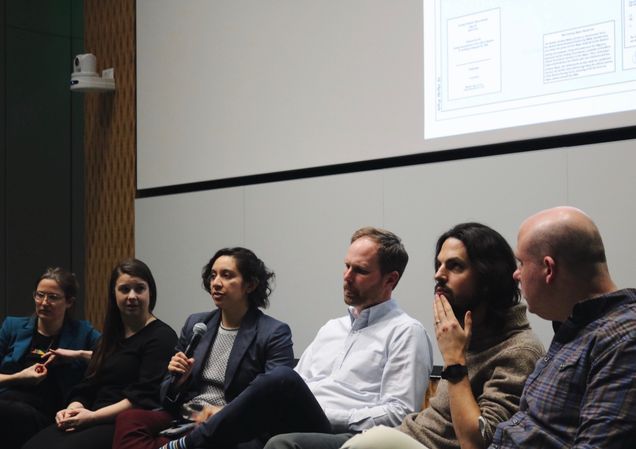
This Spring, the Capstone class is working with the City of Hyde Park on six projects that are either focused on developing green spaces or boosting economic development in the city. The course is co-taught by Professor Madhu Dutta-Koehler, Ph.D. and Matt Smith MCP ‘19, but allows students to get hands-on experience in a non-traditional classroom. During the discussion, the panelists and speakers brought up important information that students were then able to apply to their projects. The projects require intensive research on the City of Hyde Park and the speakers reiterated the importance of this research during their presentations.
“Using data to tell a story is one of the most important things to do as a planner,” said Matthew Resseger.
Additionally, the speakers encouraged students to look to the community to answer many of the questions that they may have about their projects. Considering that the projects are meant to improve the lives of residents, the groups have to focus on what residents actually want.
When asked the question: “How do we create a project applying social and environmental value that can also be justified by its financial value”, the panelists were able to give a variety of insights. Responses varied from working with nonprofits to providing culturally relevant uses. However, Eric Halvorsen offered an insight that’s often overlooked, “Sometimes you don’t need an economic justification. Sometimes you do things solely because there are social and environmental benefits,” Halvorsen said.

The running theme of the night was that urban design is a creative and collaborative process. Developing solutions to the problems faced by many cities requires creativity and innovation. The panelists suggested collaborating with residents, property owners, NGOs, and others to ensure that their projects are as effective as possible. However, it’s even more important that students collaborate with their fellow group members.
Imani Roberson, CAS'20/COM '20
Mayor Walsh Congratulates Metropolitan College Students at 11th Annual City of Boston Scholar Reception

On February 5th, Boston University Metropolitan College and the City of Boston held the 11th Annual City of Boston Scholar Recognition Event. The City of Boston Scholar Program provides graduate scholarship opportunities to City of Boston employees who are taking courses at BU towards master’s degrees and graduate certificates.

Boston Mayor Martin J. Walsh applauded the efforts of city employees who have taken the opportunity to pursue higher education at Boston University.
"Mayor Walsh believes in employees' professional growth and in ensuring all Boston residents can access and complete their post-secondary education," said Winston Pierre, MCP '20, Diversity Programs and Outreach Director for the City of Boston. "The City of Boston Scholarship program is a testament to Mayor Walsh's commitment to that cause. I am proud to be working for an administration that values higher education and makes it a top priority."
The event also featured remarks from Metropolitan College Dean Tanya

Zlateva; Vivian Leondard, Director of Human Resources for the City of Boston; and City of Boston Scholar, Katy Janvier.
Six scholars from the City Planning and Urban Affairs Program were recognized and received rewards.
- Elizabeth Bagley (Master of City Planning)-Boston Transportation Department
- Emily DaSilva (Master of Urban Affairs)- Boston Public Health Commission
- Mollie Hutchings (Master of City Planning)-Department of Public Works
- Winston Pierre (Master of City Planning)-Mayor’s Office of Diversity
- Marco Rebaza (Master of City Planning)- Department of Neighborhood Development
- Rebecca Singh (Master of City Planning)- Public Facilities Department
“In the City of Boston, I think every city employee will echo this sentiment that: we are eternally grateful to the Mayor for believing in us; investing in us so we can all serve and lead with empathy, compassion, and knowledge," said Pierre.
Imani Roberson, CAS '20/COM '20
BUCPUA’s Fall 2019 Town Hall — On Vision 2025 and a Growing Program
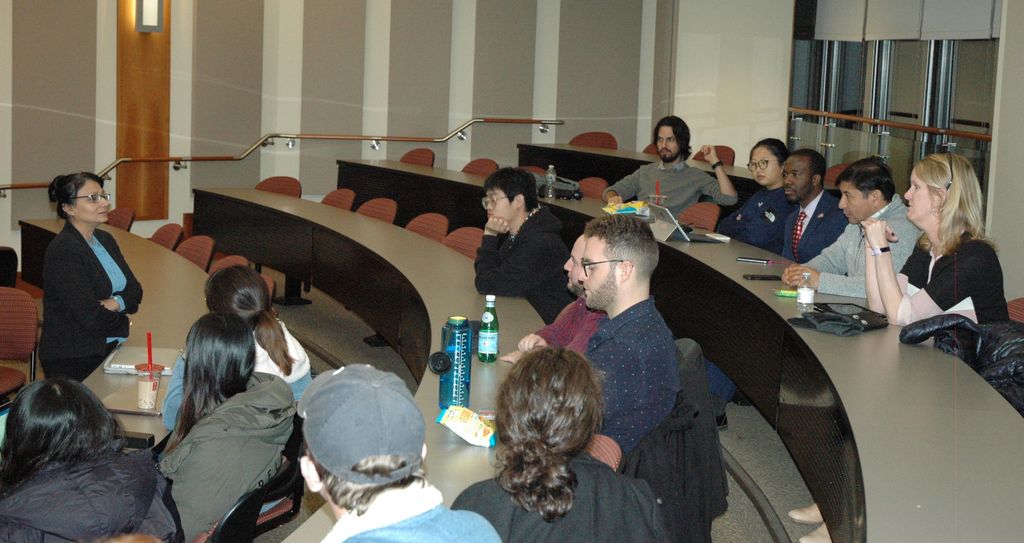
BUCPUA held their annual town hall Thursday evening, November 7, 2019, where students, faculty, and staff discussed where the program is currently at, goals for the future, and initiatives being taken to reach those goals. Dr. Madhu Dutta-Koehler, Professor of the Practice and Program Director, presented on logistics, concerns, and the future of BUCPUA throughout the evening. With an 89% employment rate after graduation, 650+ people in the CPUA community, and a 50% growth rate, Dr. Dutta-Koehler stressed the importance of academic development, increasing enrollment, career services, and alumni networking for the coming years.
BUCPUA will achieve these goals with Vision 2025. Vision 2025 is BUCPUA’s new creative program building effort centered on the E2Pedagogical Model that focuses on both exponential and experiential learning. Courses will encompass more experiential learning where knowledge will link to professional practice, becoming more practical for students with a CPUA degree. Dr. Dutta-Koehler explained how teaching methods must change since “solutions are not what they used to be, therefore we need new ways of thinking and solving problems.”
CPUA will also focus on increasing full-time enrollment and international diversity as well as reaching new heights through program outreaching and — for the first time ever — fundraising. Not only is CPUA looking for the best model to implement for hybrid/online degrees, CPUA is also looking to initiate interdisciplinary graduate degrees and 4+1 programs across BU. There are also steps being taken for CPUA to become a PAB accredited program.
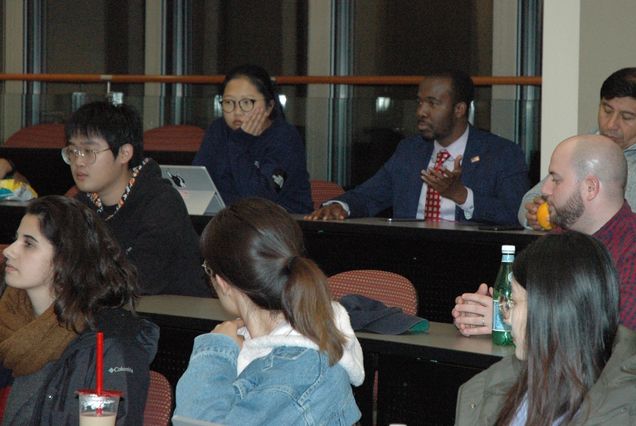
One implementation on the forefront is establishing a Laptop Program which would give students access to subsidized laptops with installed applications to all the software necessary for their planning profession. The idea behind the Laptop Program is that every student would have access to the same technology and platforms, increasing collaboration effectiveness, and allow students to be more equipped for their future career in planning. However, those in attendance for the town hall agreed that it would be best if the program was optional or offered to students in particular classes. Students want the software for themselves, and a recommendation made was for CPUA to hold workshops to setup programs and secure student licenses.
After discussing Vision 2025, Dr. Dutta-Koehler, opened the floor for discussion and feedback on a few topics including events, alumni engagement, and internships. The number of BUCPUA events has increased, yet attendance has decreased, so Dr. Dutta-Koehler posed the question ‘what changes needs to be made?’ A common issue members of the CPUA community had with past events is their timing. Most events are held during class so switching up the timing of events would be helpful, and many audience members suggested the positive reinforcement of class participation for attending program events.
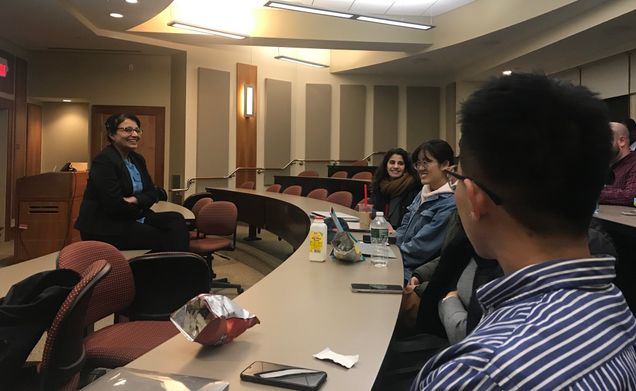
Another hot topic of the night was increasing alumni engagement and how connecting alumni with current students would be beneficial for mentoring and networking opportunities. Suggestions for increasing alumni connectivity included creating events for CPUA members during alumni weekend, introducing UPA Table Talk Sessions, as well as creating a yearly alumni event with a panel and a banquet — which also be paired with the new initiative to fund raise.
The night ended with a conversation on the importance of internship and increasing the number of students who partake in internships. Currently only 36% of students have completed an internship and CPUA would like to increase that percentage due to the valuable experience internships hold. However, it was duly-noted how internships can be expensive for students (since an unpaid internship can equate to the workload of a job) and hard to organize or find. One solution discussed was approaching internships as a self-guided study which equates to class credit. Another solution discussed was creating a project-based internship that is offered as a class where students would work for an employer and check in with a professor, working on a project for a grade.
Overall, BUCPUA’s Fall 2019 Town Hall was a major success. The future of the program was discussed at length, community opinion was gathered, and how positive progress of the program will continue through Vision 2025.
Delanie Fico, CAS '21
BUCPUA Fall 2019 Keynote Lecture — An Insightful Discussion with Former U.S. Rep. Michael Capuano on Community Engagement
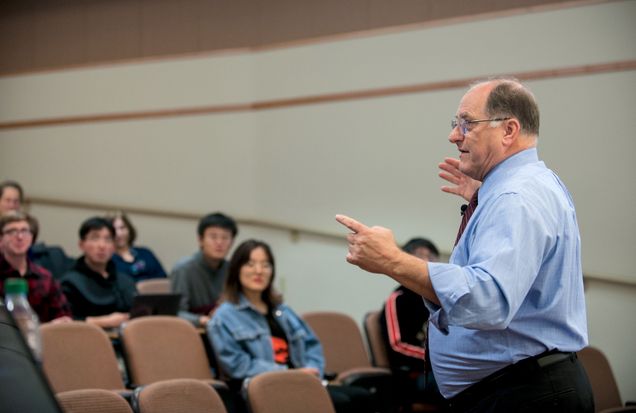
On Wednesday evening, October 16, BUCPUA hosted the Fall 2019 Keynote Lecture with former US Representative Michael Capuano, who spoke on the importance of engaging with communities as planners.
Capuano was the mayor of Somerville for 10 years and spent 20 years in Congress where he had a fiery passion for advocating for urban issues. Brian Creamer, an adjunct faculty member and BUCPUA alum, gave a warm welcome to Capuano, who began the keynote by stating: “This is not a lecture, lectures are boring, sorry professors, I hope [this keynote] is an interaction.”
Capuano opened with the importance of interacting with the people planners are planning for. He posed a question to the audience, “what are you trying to accomplish as planners?” For him, planning is about constructing a better life for multiple different people in many different communities, with many different desires. He then asked the audience, “who are you working for?” As planners, there is a conflict, is the answer an employer or the community?
Capuano grew up in Somerville, a densely populated city with no high-rise buildings, just two and three family homes. Growing up, Capuano felt the effects of outside planners who thought they knew what the community wanted without consulting the community. His discussion on the importance of engaging with communities picked up here.
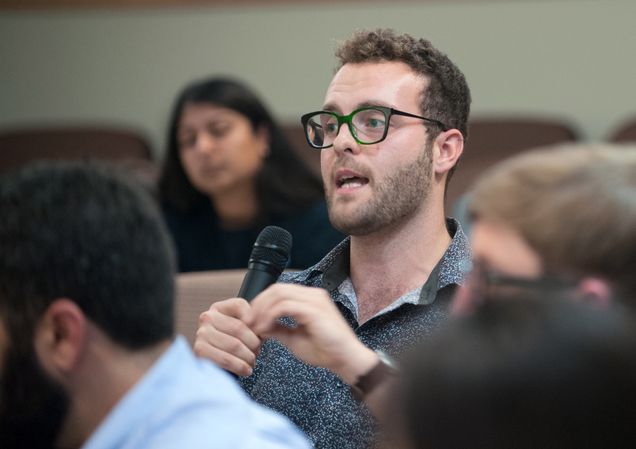
Planners, according to Capuano, have to take everything into consideration before taking action, which includes engaging the community members, asking their opinions, and listening to them. Opinions matter, “go talk to some people,” Capuano stressed. He gave the example of traffic pattern planning, where the planner goes outside and watches what is going on for a few hours, assessing the changes proposed and how they would consequently affect the surrounding areas. Considering the real impacts, not just the impacts a book might state, is a huge part of a planner’s job, and must be taken seriously in order to create a healthy relationship between communities and planners.
Engaging communities before making a decision is vital according to Capuano. Listening to everyone allows for open communication and elevates bad attitudes since the planner no longer is a stranger who wants to change everything without consulting those whose lives the change will affect.
Capuano emphasized that these are conversations that are not regularly held because they are difficult conversations that aren’t straight forward but are extremely important. Opinions should be heard and, if they are not agreed with, respectfully disagreed with, or taken into consideration while planning. For Capuano, honesty is the best policy because respect is driven through honesty about views and plans.
Brian Creamer then opened the floor for questions, where students, faculty, and guests were eager to discuss the topic of engagement. The first question asked was: “What are the most effective ways to generate real engagement?”
“Get up and go talk to people, get out, go knock on a door, it is not that hard,” Capuano answered. There is an importance about offering to hear their voice rather than just sending an email that they may not read. Talk to people before announcements are made so that as a planner, issues can be considered before they arise. “Apply learnings in a way that will help people you are planning for with their opinion in mind.”
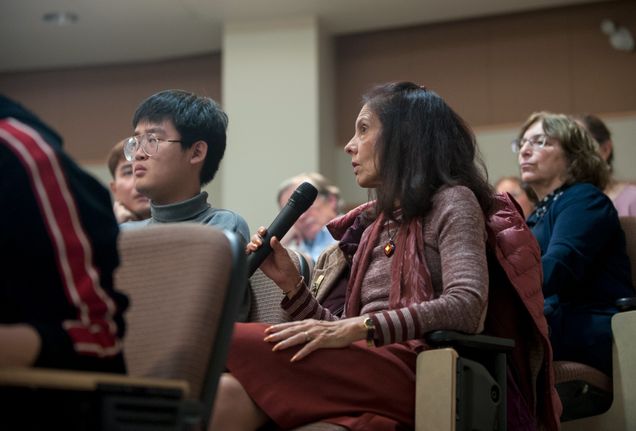
There was a multitude of questions that followed which discussed prominent planning issues and ideas around the Greater Boston area. Topics discussed include the Green Line Extension, the Silver Line history, the push for sustainable living, the importance of condo control, and the growing population of developers in Boston who are invading neighborhoods such as Roxbury, Jamaica Plain, and Allston.
Capuano closed the discussion with the importance of hearing, listening, and either respectfully agreeing or disagreeing with community members: “to not ask generates anger and distrust [among the community].”
The night ended with the audience feeling fulfilled in learning more about how engaging with communities benefits all parties involved in planning and should not be overlooked.
Missed the keynote or want to learn more? Check out the recording on Youtube!
Delanie Fico, CAS '21
BUCPUA Hosts an Informative Portfolio and Visual Design Session
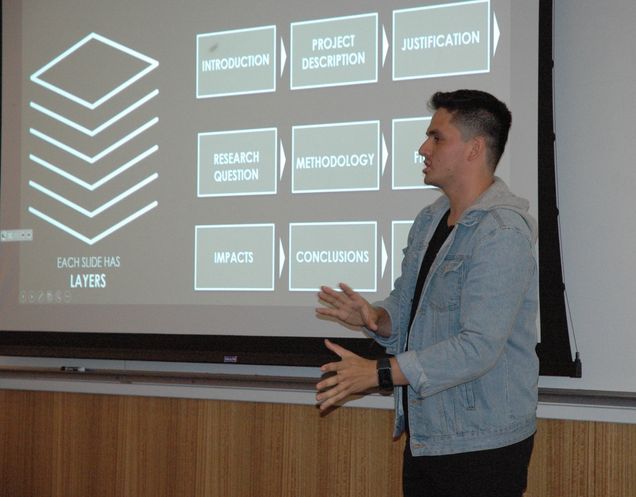
On Monday, October 7th, BUCPUA alum David Valecillos (MCP ‘14), Director of Design at North Shore CDC, and BUCPUA alum Rubén Cerón (MCP ‘19), Design and Placemaking Project Manager at North Shore CDC, hosted a lecture on the key aspects of designing a portfolio and presenting visual projects.
Valecillos discussed the elements which create the best portfolios for planners. He emphasized four key elements: 1. color and text, 2. formatting, 3. general content, 4. portfolio layout. It is important for planners to decide what they professionally want to do and then connect their professional drives to specific companies, tapping into their culture while building a portfolio. Valecillo stressed that simplicity and stylistic choices lead to clean portfolios that affect the reader, and the importance of considering those choices while creating a portfolio.
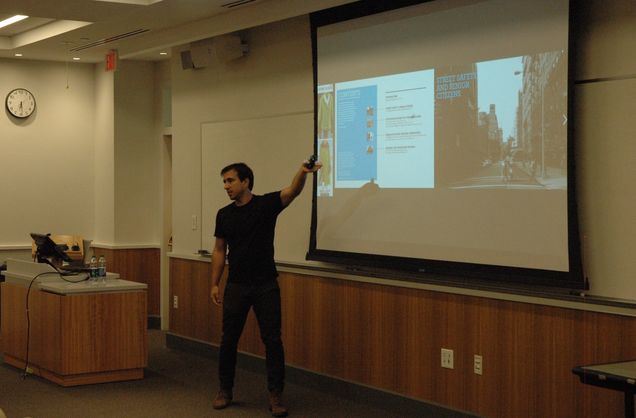
Afterwards, Rubén Cerón took center stage. Cerón presented using PowerPoint, highlighting certain tools the program offers to enhance presentations. Cerón’s presentation itself demonstrated engaging visual representations that planners could use as examples when creating their own presentations. He highlighted how PowerPoint is a way to project and support a planners ideas in a communicable way. A presentation should always include visualization of the planners ideas in maps, graphics, photos, or drawings. Cerón ended his presentation by showing examples of visual data and design for planners.
The lecture was lively with many eager planners waiting to ask questions about their future endeavors into the world of portfolio making and designing presentations. When the evening ended, students had increased fluency in professional communication through design.
Delanie Fico, CAS ‘21